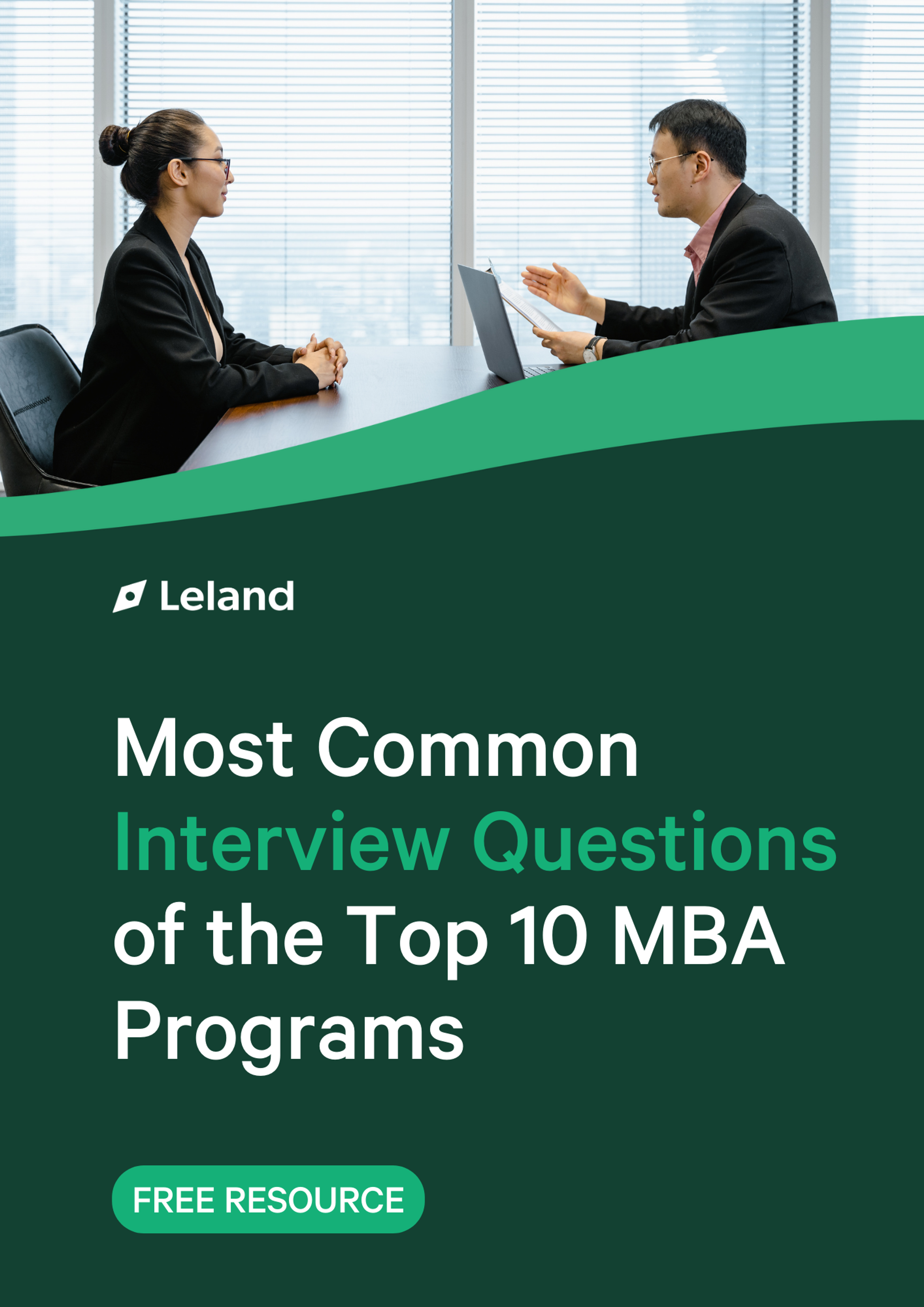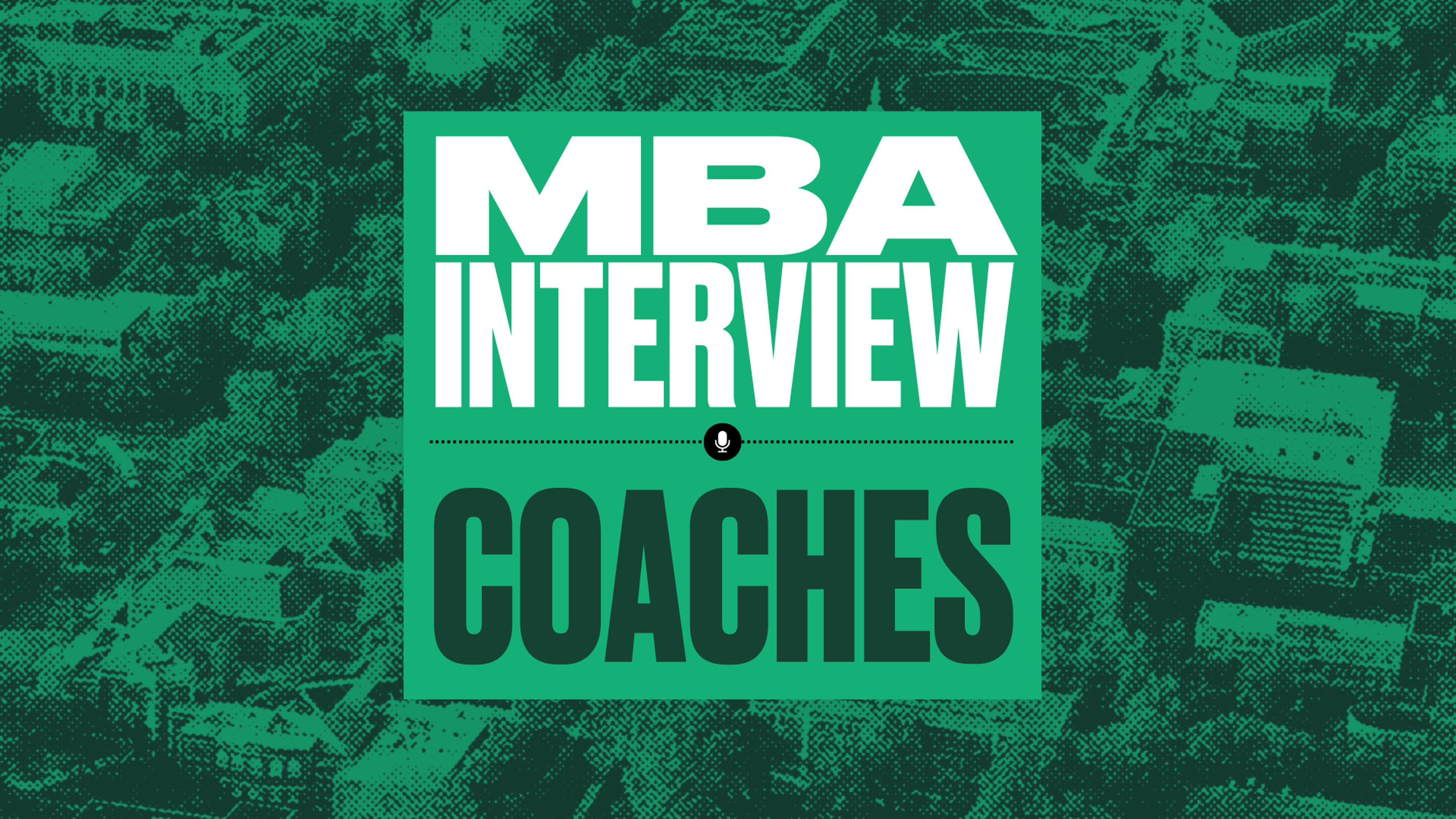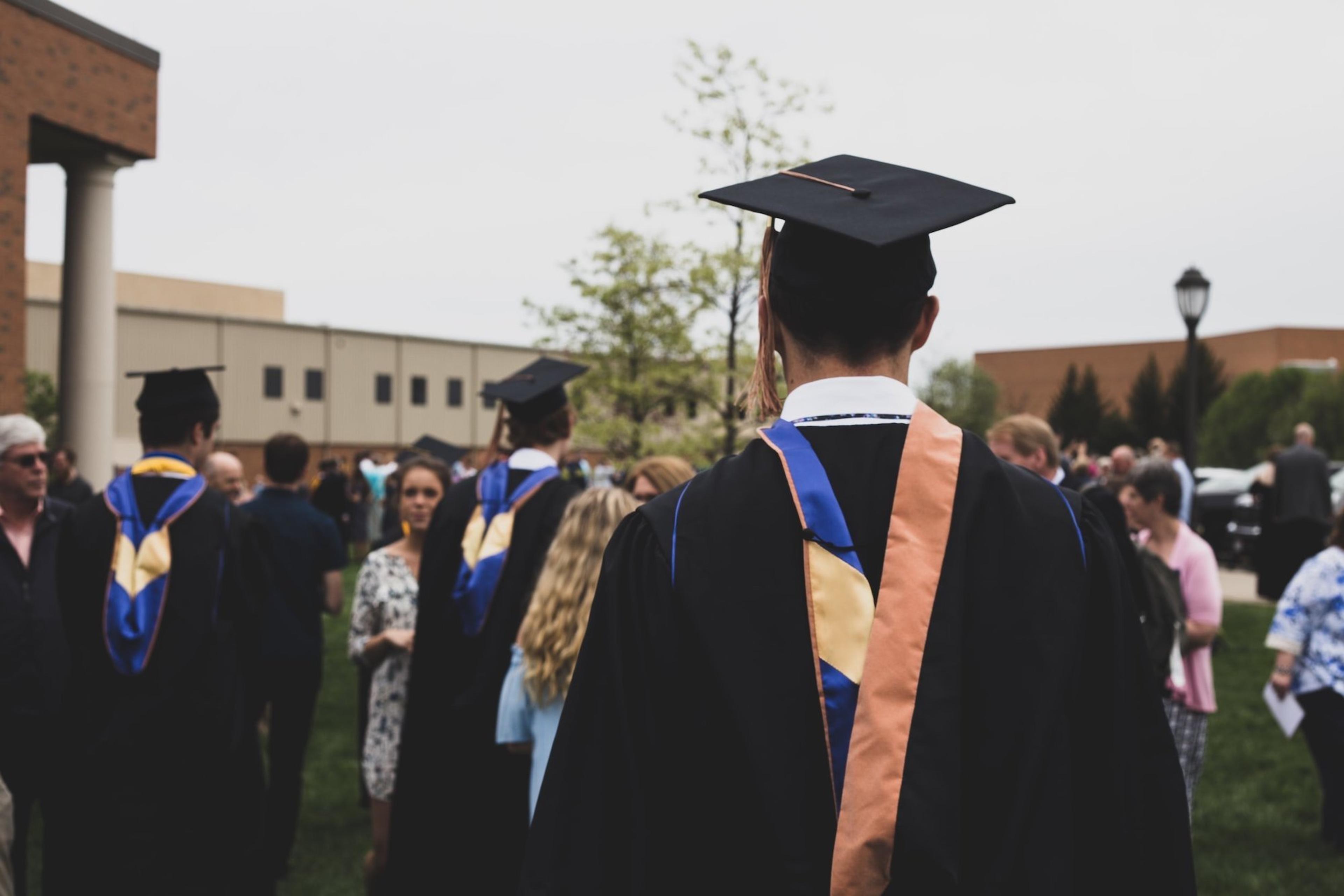Top 20 Questions to Ask During Your MBA Application Interview
Ace your business school interview with these expert-approved questions to ask in your MBA interview — stand out, show depth, and spark real conversation, with advice from an expert MBA admissions consultant.

By Becky S.
120+ M7 & T15 Admits | Former MBA Adcom Fellow | Expert w/ 15+ YOE
Posted March 26, 2025

Table of Contents
Free Event

Featuring Melanie E.
How to Get a Head Start on Your MBA Application
Starting Wednesday, April 16
10:00 PM UTC · 60 minutes

Featuring Melanie E.
If you plan on applying to or attending business school, you must be prepared for the MBA interview. A strong interview can significantly impact your candidacy, influencing the committee’s perception beyond your written application. It's your chance to sit in front of a real human and explain your background, your story, and your goals.
For this reason, having genuine, intelligent, and relevant questions prepared ahead of time is very important if you want to ace this portion of the admissions process. Well-researched and meaningful questions not only demonstrate your interest, intellect, and preparation, but also helps you engage in a more dynamic and impactful conversation with your interviewer.
I am an MBA admissions consultant and career coach with 15+ years of experience helping candidates gain admission to top business schools. I have successfully mentored 200+ MBA applicants, guiding them to admission at the best programs in the world, like Harvard Business School, Stanford GSB, Wharton, MIT Sloan, and Columbia Business School.
Before we dive into recommendations on questions, it's important to know what to expect when you walk into the room for your interview. While all top MBA programs include an interview component, the format, question style, and interviewer vary significantly across schools. Some schools extend interviews to nearly all applicants, while others reserve them for the most promising candidates. Let's break this down.
Interview Formats of the M7 MBA Programs
There are several important distinctions in interview formats between schools. The biggest differences to be aware of include:
- In-person vs. Virtual – More and more schools have moved to virtual interviews in the post-Covid era. Some are now exclusively online whereas others offer in-person in major business hubs around the world as well as on-campus for those that wish to travel.
- Interviewer –
- Admissions Officers: These interviews are often more formal and focus on assessing your fit within the program's culture and values.
- Alumni Interviewers: Alumni may provide insights into the program's real-world applications and evaluate how your experiences align with the school's offerings.
- Current Students: Interviews conducted by current students can offer a peer perspective, focusing on your potential contributions to the student community.
- Blind vs. Not Blind – Some interviewers conduct 'blind' interviews, meaning they have only reviewed your resume. Others have access to your full application, including essays and recommendations, allowing them to ask more tailored questions.
- Invite Only vs. Open – M7 schools differ in interview selectivity; for example, HBS interviews about 20% of applicants, while Kellogg aims to interview as many as possible. Understanding your target school's approach can help you set realistic expectations.
For the full guide on MBA interviews, check out: How to Ace Your MBA Interview: With Prep Questions & Answers
Stanford GSB
The GSB interviews only a select number of applicants, usually two to three people for every one spot in the class so being extended an invitation to interview is a positive sign, but not a guarantee. The interview is heavily behavioral, emphasizing past experiences to gauge leadership, decision-making, and values. Expect deep dives into specific instances of professional and community impact.
Interviews are conducted by alumni or admissions officers, offering applicants a firsthand glimpse into the program’s culture and expectations. Candidates should be prepared to articulate their most meaningful experiences and how they align with Stanford’s mission.
- Interviewer: Alumni or MBA admissions officer
- Format: Virtual or in-person
- Length: 45-60 minutes
- Timeline: Late September to late November (Round 1), mid-January to mid-March (Round 2), and late April to mid-May (Round 3)
Read: How to Nail Your Stanford GSB MBA Interview: Overview, Questions, & Tips
Harvard Business School
Harvard Business School (HBS) maintains a selective interview process, inviting approximately 20-25% of applicants. A distinctive aspect of HBS's process is the mandatory "post-interview reflection," which candidates must submit within 24 hours of their interview. Interviewers at HBS, typically admissions board members, conduct comprehensive reviews of each applicant's entire application to tailor the conversation to the individual's experiences and aspirations. This approach allows the school to gain deeper insights into each candidate's fit with HBS's values and culture.
- Interviewer: Admissions board member
- Format: In-person (in a major city), Zoom, or on-campus
- Length: 30 minutes
- Timeline: October (Round 1), late January to early March (Round 2)
Read: How to Ace Your HBS MBA Interview
University of Chicago Booth
The University of Chicago Booth School of Business invites approximately 50% of applicants to interview, indicating serious consideration of their applications. Common interview questions reported by past candidates include:
- "Why are you pursuing an MBA?"
- "Why did you choose Booth?"
- "Can you tell me about yourself?"
- "How would you describe your leadership style?"
- Interviewer: Current student, graduate, or admissions staff member
- Format: On-campus, in-person, or virtual
- Length: 30-45 minutes (including about 10 minutes for Q&A)
- Timeline: Mid-October to early November (Round 1), end of January to February (Round 2), mid-April to mid-June (Round 3)
How to Nail Your Booth MBA Application Interview: Overview, Questions, and Tips and How to Answer the “Why Booth?” Interview Question
University of Pennsylvania Wharton
The Wharton School at the University of Pennsylvania employs a distinctive interview format known as the Team-Based Discussion (TBD). Invited applicants, approximately 40% of the pool, participate in a group discussion with four to five peers, collaboratively addressing a provided prompt to develop a solution. This format assesses candidates' teamwork, communication, and problem-solving abilities. Following the TBD, each applicant engages in a brief, ten-minute one-on-one interview with a member of the admissions committee to reflect on the group interaction and discuss individual motivations.
- Interviewer: 4-5 other applicants and then a member of the admissions committee
- Format: Virtual
- Length: 45 minutes
- Timeline: Late October (Round 1), mid-February (Round 2), mid-April (Round 3)
Read our full article on Wharton’s interview here: Wharton Interview Guide: The Team-Based Discussion

Northwestern University Kellogg
At Northwestern University's Kellogg School of Management, interviews are conducted in a "blind" format, where interviewers have access only to the applicant's resume, not the full application. This approach encourages candidates to share and elaborate on personal and professional experiences that motivated their pursuit of an MBA at Kellogg. Notably, Kellogg strives to offer interviews to all applicants, underscoring the school's commitment to holistic evaluation.
- Interviewer: Current student, alumni, or MBA admissions officers
- Format: Virtual
- Length: 30-45 minutes
- Timeline: Applicants schedule their own interviews within six weeks of the application deadline
For more Kellogg interview tips, read: How to Nail Your Kellogg MBA Interview: Overview, Questions, & Tips
Columbia Business School
At Columbia Business School (CBS), interviews are also conducted in a "blind" manner, with interviewers reviewing only the applicant's resume. CBS extends interview invitations selectively, making an invitation a positive indicator of interest, though it does not guarantee admission. Uniquely, CBS does not mandate interviews for all applicants; some may be admitted without an interview.
- Interviewer: Usually an alumnus, occasionally an MBA admissions officer or current student
- Format: In-person or virtual
- Length: 45-60 minutes
- Timeline: Variable, within six weeks of submitting the application
Read: Ace Your Columbia Business School MBA Interview: Expert Tips and Sample Questions
Massachusetts Institute of Technology Sloan
The Massachusetts Institute of Technology's Sloan School of Management utilizes a "Behavioral Event-Based Interview" format, concentrating on candidates' past actions and decision-making processes rather than hypothetical scenarios. Interviewers delve deeply into specific experiences, often with extensive follow-up questions, resulting in fewer distinct questions compared to other programs. Approximately 20-25% of applicants receive interview invitations, reflecting Sloan's selective approach.
- Interviewer: Admissions committee member
- Format: Virtual
- Length: 30-45 minutes
- Timeline: Invitations are sent on a rolling basis until the decision deadline
For more expert advice on the MIT interview, read our article How to Nail Your MIT Sloan MBA Interview: Overview, Questions, & Tips

Most Common Interview Questions of the Top 10 MBA Programs
Download our free guide to the most common MBA interview questions to be as prepared as possible to nail your interview
MBA Interview Tips
MBA interviews, like every other part of the MBA application, require a lot of preparation. Make a list of the main stories and examples you want to use and practice saying them. Utilizing frameworks like STAR (Situation, Task, Action, Result) can help structure your responses effectively. Additionally, practice common MBA interview questions alongside those specific to each school's unique offerings and values to ensure comprehensive readiness.
Prepare Differently for Different Kinds of Interviewers
Tailor your preparation based on your interviewer's background. When engaging with alumni or current students, focus on their personal experiences and insights into the program's culture. Conversely, with admissions committee members, emphasize how your goals align with the school's mission and values. Adapting your questions accordingly demonstrates your genuine interest and thorough preparation.
Expert Tip: Reaching out to past and current students from the schools you’re interviewing with can help you craft thoughtful questions for the interview and clarify if the program aligns with your career goals. It not only will get you fodder for your interviews but also ensure that you end up at the best program for you. When reaching out to students and alumni, start with those to whom you have some kind of connection – maybe you went to the same undergrad institution, played the same sport, are pursuing the same career, etc.
Show Genuine Enthusiasm for the Specific Program
Schools want to admit students that actually want to go there. Showing a good sense of how the program aligns with your goals reflects well on your preparation and commitment. Go into the interview well-versed in the school’s specificities. Discuss aspects of the school’s learning environment that resonate with you, such as collaborative projects or case studies. What are its strengths and weaknesses? What are some of the classes taught at the program that you’re most interested in? What attracts you to this program over others?
Consider attending an admissions event to meet admissions officers and learn more about the program’s focus areas, culture, and expectations. Admissions events often provide a preview of what each school values in candidates, and they make a note of who has registered. Take a tour of the campus if you’re able and open emails from the marketing team.
Expert Tip: When discussing your interest in the program, avoid comparing it directly with other schools. Instead, focus on the unique aspects that draw you to this MBA program. What can only that school offer you (that is specific to you, your background, and your goals)?
Showcase Your Emotional Maturity
Emotional intelligence is a critical attribute that MBA programs value, as it influences leadership effectiveness and team collaboration.
Ways to Demonstrate Emotional Maturity:
- Self-Awareness:
- Strengths and Weaknesses: Be prepared to discuss your strengths confidently and acknowledge areas for improvement with a growth mindset.
- Reflective Practice: Share experiences where you sought feedback and used it constructively.
- Empathy:
- Team Dynamics: Provide examples of how you've considered colleagues' perspectives to achieve team objectives.
- Conflict Resolution: Discuss situations where you navigated interpersonal conflicts effectively.
- Resilience:
- Overcoming Challenges: Describe instances where you faced setbacks and the strategies you employed to overcome them.
- Adaptability: Highlight your ability to remain flexible and positive in changing environments.
Ask Questions Relevant to Your Interests
Remember, this interview is also a chance for you to see if it’s a good fit for your background, interests, and goals. Most MBA students find interviews a crucial part of the admissions journey, allowing them to showcase their unique experiences and perspectives. For prospective MBA students, preparing for these interviews can set the foundation for a successful application. The questions you ask should be ones that you are genuinely interested in. You are the only “you” applying. Don’t talk about what you think the interviewer wants to hear.
Expert Tip: For some schools, you will know who your interviewer is ahead of time. If that’s the case, research your interviewer. Look up their educational and work history, personal interests, and whatever else you can find online. This will help you ask much better questions and also show the interviewer that you cared enough to do your due diligence. See this interview with a Stanford GSB deferred admit who asked his MBA interviewer about steak.
Avoid Yes/No Questions
Don’t ask yes/no questions or ones that have a “right” answer. Basically, don’t ask them about any information that you could get in a ten-second Google search. The interview is a chance for you to learn things about the program that you couldn’t get anywhere else and that are aligned with your interests. Relatedly, only ask questions that you think the interviewer will actually have an answer to.
If you’re looking for some inspiration from MBA interview questions you might encounter during your conversation, read our article: Most Common M7 MBA Interview Questions.
Questions to Ask in Your MBA Interview
What to Ask an Alumni
When preparing for your MBA admissions interview, keep in mind that engaging with former MBA graduates as often as admissions officers can be extremely valuable in teaching you otherwise hard-to-get information about the program's culture, alumni network, and the real-world application of the education experience.
When you engage with alumni or current students, you get firsthand insights into the day-to-day experiences and opportunities within the program. MBA alumni interviewers are great because they tend to offer firsthand perspectives that can help you gauge whether the program aligns with your career goals and personal aspirations. Using them, you can ask about the student experience and how the program’s culture and resources have impacted alumni personally and professionally.
Here are some valuable questions to ask an alumni interviewer to deepen your understanding of their MBA journey and the impact of their experience while simultaneously proving to them that you’re a strong candidate for admission:
- What was your experience like at the school? How has it affected your career since?
- What aspects of the program had the most significant impact on your career progression?
- What is the alumni community like? What has your experience been with it?
- What do you wish that you had done differently during your own MBA program?
- What are some of the most impactful skills or lessons you acquired during your MBA program that you feel were unique to this school? How have these skills or lessons benefited you in your career?
- How did the school support your career goals and aspirations? Are the academic and career services at [university] helpful?
- What opportunities for networking and professional development did you find most valuable?
- How has the school's culture influenced your personal and professional growth?
- What advice would you give to future students/someone starting the MBA program at this school?
- Can you share any memorable experiences or highlights from your time in the program?
- As you may know, I am interested in [industry], and although I’m familiar with [program’s resources], do you know of anything else at the university that would benefit me?
What to Ask an Admissions Officer
Interviewing with an AdCom member is an opportunity to explore the specifics of the MBA program, its curriculum, and its evaluation criteria from a professional’s perspective. Interviews conducted by MBA admissions officers often provide a chance to discuss the MBA program’s core mission and values. These officers can give a deeper understanding of what the school seeks in its candidates.
They play a pivotal role in shaping the program and selecting candidates who align with the school's values and goals, so it’s important that you appear thoughtful and determined about finding your fit in the program. An admissions counselor can also provide insights into the selection process, helping you understand how your profile compares to other candidates.
Here are ten pertinent questions to ask this type of MBA interviewer to gain clarity on the program's offerings, support systems, and expectations for successful applicants.
Note: For those considering both traditional and online MBA programs, be sure to ask how the online format compares in terms of networking opportunities and resources. Asking such a question shows your proactive interest in understanding how the MBA program supports students with similar career goals. You can also ask about faculty involvement and how accessible professors are to students seeking mentorship.
- What are the types of students who most succeed in the MBA program here? What traits do they possess?
- I have [X career interest]. How have you seen the school benefit other MBA students with goals like mine?
- What do you think are some of the most innovative or unique courses offered in the program?
- Given my background and interests, what resources or opportunities do you think I should focus my time and energy on during the MBA program?
- How does the school/program define success for MBA students in both the short and long term?
- What kind of support does the school provide for students interested in entrepreneurship (or any specific field)?
- How does the MBA program’s career services team assist students with job placement and internship opportunities?
- How does your program integrate experiential learning opportunities, such as internships, projects, or global immersions?
- Can you describe the relationship between the MBA program and the local business community or industries?
- What steps does the school take to ensure continuous improvement and adaptation of the curriculum to meet evolving industry trends?
What to Ask a Current Student (Second-Year)
Interviewing with a current second-year student during your MBA admissions interview can provide valuable insights into the program's culture, workload, and student life. These conversations can help you assess how well you might fit into the community and what to expect during your time in the program.
- How accessible are the faculty, and what has been your experience with mentorship opportunities?
- Can you share your experience with the school's career services and how they've assisted in your job search?
- What clubs or organizations are you involved in, and how have they enhanced your MBA experience?
- What has been your favorite aspect of the MBA program so far?
- What surprised you most about the program once you started?
- What kind of person thrives in this program?
- If you could go back in time, what advice would you give yourself as an incoming MBA student?
- What classes or programs do you think best prepared you for your internship or career?
Becky S. is an expert MBA admissions consultant and career coach with over 15 years of experience helping candidates get into top programs like HBS, Stanford GSB, Wharton, MIT Sloan, and more.
A Wharton MBA herself, Becky offers personalized, strategic guidance across the entire admissions and recruiting journey — from crafting a standout application to landing your dream internship or job. Her coaching methodology is highly customized to each applicant’s strengths and goals. She specializes in application strategy, interview preparation, and career transitions, ensuring every client presents a compelling narrative that resonates with admissions committees. Book a free intro call with Becky and take the next step toward acing your MBA interview.
Next, read:
- Six Coaches' Best Advice for the MBA Interview
- How to Build a Lasting Connection in Your MBA Interview
- How to Nail Your Virtual MBA Interview
FAQs for MBA Program Interview Questions
What is the purpose of an MBA interview?
- The MBA interview is a crucial part of the application process that allows the school to assess your fit for their program. It also provides you with an opportunity to learn more about the program and determine if it aligns with your career goals and personal aspirations.
How should I prepare for my MBA interview?
- Prepare by researching the school's program thoroughly, understanding its unique offerings, and reflecting on your experiences and goals. Practice answering common interview questions using a structured approach like STAR (Situation, Task, Action, Result), and prepare thoughtful questions to ask your interviewer.
What types of questions should I ask an alumni interviewer?
- Ask questions that help you understand the alumni's personal experience, the culture of the program, and the long-term benefits of the MBA. Focus on gaining insights into their career progression, networking opportunities, and any advice they have for new students.
What types of questions should I ask an admissions committee member?
- Focus on questions that give you a deeper understanding of the program's curriculum, support systems, and evaluation criteria. Inquire about resources for your specific career interests, the program's unique courses, and how the school supports entrepreneurial initiatives and career placements.
How can I tailor my questions for different interviewers?
- For alumni interviewers, focus on personal experiences and outcomes. For admissions committee members, ask about the program's structure, resources, and how it aligns with your career goals. For current MBA students, focus on their experience at the program thus far. Make sure to tailor your questions to the interviewer's perspective to get the most relevant information.
Why is it important to ask thoughtful questions during the interview?
- Asking thoughtful questions demonstrates your genuine interest in the program and helps you gather important information that isn't available through other sources. It also shows that you have done your homework and are serious about finding the right fit for your MBA studies.
What should I avoid asking during the MBA interview?
- Avoid asking questions that can be easily answered through a quick online search or that have obvious answers. Steer clear of yes/no questions and focus on open-ended questions that allow the interviewer to provide detailed insights.
How can I show genuine enthusiasm for the program during the interview?
- Show enthusiasm by being well-prepared, knowledgeable about the program, and by asking questions that reflect your specific interests and goals. Express how the program's unique offerings align with your career aspirations and personal development.

Written by Becky
5.0
(28)
Hi! I am Becky Song - an admissions consultant and professional career coach with over 15 years of experience supporting students and candidates through their admissions and career development journeys. I am currently the Executive Director of Ivy Journey LLC (Professional Admissions & Career Consulting - https://www.theivyjourney.com/) and hold an MBA degree from The Wharton School of the University of Pennsylvania, specializing in Entrepreneurship & Innovation and Finance, and a BA from Vanderbilt University, where I was a recipient of the prestigious full-tuition Chancellor’s Scholarship. Over the past decade, I have successfully mentored 200+ college and MBA applicants, empowering them to achieve their full academic potential by gaining admission to their dream programs. I provide personalized and comprehensive guidance to help my students navigate the complex college admissions process with confidence and success. For college admissions, my students have earned spots at many of the top institutions in the US, such as Harvard, Columbia, MIT, Stanford, UPenn, UC Berkeley, JHU, Duke, Vanderbilt, CMU, NYU, etc. For MBA admissions, my clients have earned spots at many of the top programs in the US, such as HBS, Stanford GSB, Wharton, MIT Sloan, Columbia, Kellogg and Booth. I believe every candidate has a unique and compelling story to tell, and I am dedicated to helping them craft an engaging narrative and build a personal brand that resonates with admissions committees and differentiates them from other applicants. As a recruiting coach and career consultant, I have coached 100+ candidates, helping them boost their chances of successfully secure management consulting and strategy related roles at their dream companies in a competitive job market. Whether you're a student looking for an internship, a fresh graduate from college or graduate school looking for your first job, a MBA candidate looking to make a career transition or a seasoned professional who's looking for their next big move, you've come to the right place! Personally, I have made many successful transitions in my career, from actuary to non-profit leader, strategy consultant to entrepreneur. I have a diverse background in various industries, including consulting, government, healthcare and education. As an experienced management consultant and manager who has led many teams at various top consulting firms, I have served a wide range of federal government and Fortune 500 clients in the healthcare, retail, CPG, and technology industries. Whether you need guidance on application strategy, resume review, or interview preparation, I'm here to help you achieve your academic and professional dreams. I am excited to learn more about you and look forward to supporting you every step of the way. Reach out today to jump start your new journey!
Becky has helped clients get into organizations like:
Stanford Graduate School of Business
Harvard Business School
The Wharton School (UPenn)
Harvard University
Kellogg School of Management (Northwestern)


















